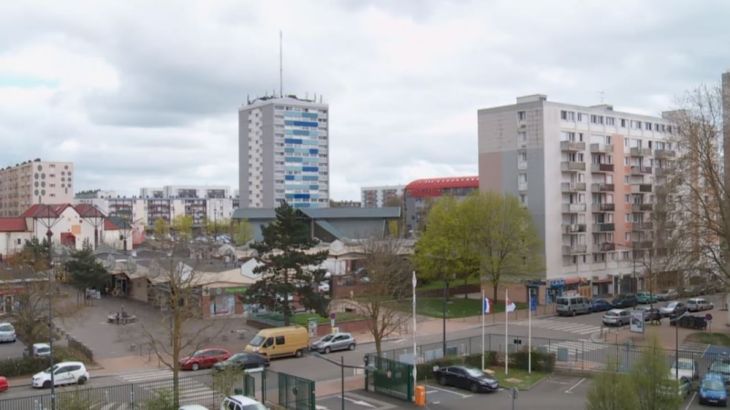New ‘battle plan’ to improve life at France’s deprived suburbs
French government launches plan to tackle discrimination and deprivation faced by people in poor suburban areas.

When Emmanuel Macron announced his bid for the French presidency in November 2016 from Seine-Saint-Denis, the poorest suburb in France, the message was clear: improving the social situation in the French banlieues, or suburbs, was one of his priorities.
Seine-Saint-Denis, located just northeast of Paris, had long been synonymous with the conditions that blight France’s banlieues – about 10 percent of France’s population live in deprived areas with high unemployment and poverty rates, crime and substandard education.
Keep reading
list of 4 itemsGabriel Attal becomes France’s youngest prime minister
Macron says protecting civilians ‘non-negotiable’ at Gaza aid conference
Macron visits Kazakhstan on strategic tour of Central Asia
Recently, the Macron government announced plans to attempt what three of the preceding governments have tried to do since these banlieues came into existence: tackle what it calls “the discrimination and deprivation” faced by people living in poor suburban areas.
One of the previous plans was introduced by the French politician Jean-Louis Borloo in 2004 under the presidency of Jacques Chirac.
But Borloo’s “social cohesion plan”, which sought to improve employment and housing opportunities, did not go far.
“The French governments have never made the suburbs their priority,” Alexis Poulin, a political analyst, told Al Jazeera.
“At most, it is a plan during the elections, based on promises without long term follow-up or an articulated plan.”
![Macron poses as he meets residents of the Cite du Chene Pointu in Clichy-sous-Bois, northern Paris, France, as part of a visit focused on the theme of urban planning [File: Ludovic Marin/EPA]](/wp-content/uploads/2018/04/5a471a8e24a540868078c9a90ced6cfa_18.jpeg)
Borloo retired from politics exactly four years ago, but was recently asked by Macron to draft a proposal for the government concerning the French suburbs.
On Thursday, he introduced a new action plan focused on the urban renewal of the suburban districts and the finalisation of renovation projects that started in the 1990s but were left half-complete.
He also called for the further development of public transportation services and measures to combat illiteracy, introduce decent wages for social workers and restore security in the neighbourhoods.
“I think these proposed changes, the space arrangements and urban development, I don’t understand what good it will do for us,” Megane Audoire Mohammad, a Seine-Saint-Denis resident, told Al Jazeera.
“I don’t see how it would improve the precariousness of our cities as well as the cultural and social distress of the residents living in poor housing conditions or unemployed people,” she added.
“Admittedly, it could make the streets more pleasant to look at, but nothing more. I don’t know if Borloo will be able to change something, it seems that his previous ideas did not really improve the current context.”
Poulin said it’s good that someone as knowledgeable on the subject as Borloo is on the job, but to “change to current situation requires a lot of time. We are talking here about whole generations”.
Social and economic gap
The word “banlieue” is widely regarded as a particularly French notion. It carries specific connotations in the French context and the banlieues remain literally and metaphorically the periphery of French society.
“When I first went to the university in Paris I was confronted with the cultural and social gap that differentiated me from my classmates. I realised I did not have the same social circles, the same socialisation habits Laila Soliman, who grew up in Seine-Saint-Denis, told Al Jazeera.
“It was difficult to make friends and get over the “banlieusarde” or the “girl from the suburbs” image that people use to put on me as soon as I would tell them where I was from or where I went to high school.”
In her opinion, the social and economic gap in French society is only growing wider.
“Communitarianism and identity seclusion are the pitfalls of the French social crisis,” she added, referring to the tendency to put community above the individual.
The situation has changed little since 2012, when Stephane Gatignon, the mayor of Paris’s impoverished northeastern suburb of Sevran, went on a weeklong hunger strike.
![Mayor of Sevran Stephane Gatignon went on a weeklong hunger strike in 2012 to highlight the plight of Sevran and other impoverished French towns [File/Etienne Laurent/EPA]](/wp-content/uploads/2018/04/a25ce10527c94c548691f23058f32d8b_18.jpeg)
Gatignon was worried that an economic crisis was pushing Sevran and dozens of other poor towns to the brink of ruin. He believed that the only way he could ask for state help for places like Sevran was by resorting to “extreme measures”.
So, he decided to camp out on the pavement outside France’s National Assembly and went on a hunger strike to demand for a 5m euro ($6.4m) assistance package.
“Our socio-economic system, in the course of structural reforms, evolves towards more and more inequalities, following a model à la Thatcher,” Thomas Guenole, a French political scientist, told Al Jazeera.
“It is therefore logical that the poorest people bear the full brunt of this worsening inequality in our society.”
‘Cultural crisis’
Commenting on the latest action plan, Guenole, the political scientist, said “Borloo has identified all the main priorities, except for one: eradicating mass unemployment”.
According to him, “serious crime, over-delinquency, drug trafficking, desocialisation of individuals” are all “symptoms of mass unemployment and extreme inequality [that] will only get worse” if mass unemployment remains unchecked”.
The youth unemployment rate across France currently stands at 20.7 percent, according to recent data from the French National Institute of Statistics and Economic Studies.
Borloo said there are 1,500 priority neighbourhoods in France, which he described as “closed archipelagos”.
His diagnosis is simple: 200 are “on the edge of the abyss”, 60 are “fracturing” and 15 have already tumbled “into conflict”.
“I believe that the crisis we are experiencing in France’s suburbs is more social and cultural, rather than economic, despite that being a significant issue as well,” Soliman, the Seine-Saint-Denis resident, said.